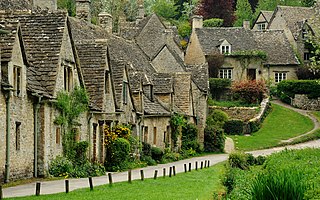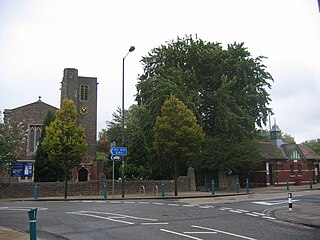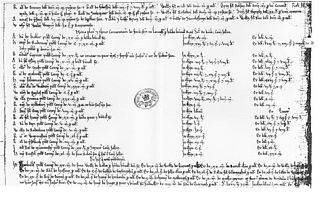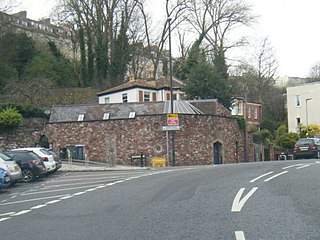
Bristol is a city, unitary authority area and ceremonial county in South West England, the most populous city in the region. Built around the River Avon, it is bordered by the ceremonial counties of Gloucestershire to the north and Somerset to the south. The county is the West of England combined authority area, this includes the Greater Bristol area and nearby places such as Bath.

Gloucestershire is a ceremonial county in South West England. It is bordered by Herefordshire to the north-west, Worcestershire to the north, Warwickshire to the north-east, Oxfordshire to the east, Wiltshire to the south, Bristol and Somerset to the south-west, and the Welsh county of Monmouthshire to the west. The city of Gloucester is the largest settlement and the county town.

The Newport Ship is a mid-fifteenth-century sailing vessel discovered by archaeologists in June 2002 in the city of Newport, South East Wales. It was found on the west bank of the River Usk, which runs through the city centre, during the building of the Riverfront Arts Centre; from which process it sustained some damage. The official name of the vessel is now the Newport Medieval Ship, to help distinguish it from other historical vessels.

Avon was a non-metropolitan and ceremonial county in the west of England that existed between 1974 and 1996. The county was named after the River Avon, which flows through the area. It was formed from the county boroughs of Bristol and Bath, together with parts of the administrative counties of Gloucestershire and Somerset.
Richard ap Meryk, anglicised to Richard Amerike was a British merchant, royal customs officer and later, sheriff of Bristol. Several claims have been made for Amerike by popular writers of the late twentieth century. One was that he was the major funder of the voyage of exploration launched from Bristol by the Venetian John Cabot in 1497, and that Amerike was the owner of Cabot's ship, the Matthew. The other claim revived a theory first proposed in 1908 by a Bristolian scholar and amateur historian, Alfred Hudd. Hudd's theory, greatly elaborated by later writers, suggested that the continental name America was derived from Amerike's surname in gratitude for his sponsorship of Cabot's successful discovery expedition to 'the new World'. However, neither claim is backed up by hard evidence, and the consensus view is that America is named after Amerigo Vespucci, the Italian explorer.

Avonmouth is a port and outer suburb of Bristol, England, facing two rivers: the reinforced north bank of the final stage of the Avon which rises at sources in Wiltshire, Gloucestershire and Somerset; and the eastern shore of the Severn Estuary. Strategically the area has been and remains an important part of the region's maritime economy particularly for larger vessels for the unloading and exporting of heavier goods as well as in industry including warehousing, light industry, electrical power and sanitation. The area contains a junction of and is connected to the south by the M5 motorway and other roads, railway tracks and paths to the north, south-east and east.

Bristol is a city with a population of nearly half a million people in south west England, situated between Somerset and Gloucestershire on the tidal River Avon. It has been among the country's largest and most economically and culturally important cities for eight centuries. The Bristol area has been settled since the Stone Age and there is evidence of Roman occupation. A mint was established in the Saxon burgh of Brycgstow by the 10th century and the town rose to prominence in the Norman era, gaining a charter and county status in 1373. The change in the form of the name 'Bristol' is due to the local pronunciation of 'ow' as 'ol'.

The Pipe rolls, sometimes called the Great rolls or the Great Rolls of the Pipe, are a collection of financial records maintained by the English Exchequer, or Treasury, and its successors, as well as the Exchequer of Ireland. The earliest date from the 12th century, and the series extends, mostly complete, from then until 1833. They form the oldest continuous series of records concerning English governance kept by the English, British, Irish and United Kingdom governments, covering a span of about 700 years. The early medieval ones are especially useful for historical study, as they are some of the earliest financial records available from the Middle Ages. A similar set of records was developed for Normandy, which was ruled by the English kings from 1066 to 1205, but the Norman Pipe rolls have not survived in a continuous series like the English.

Shirehampton is a district of Bristol in England, near Avonmouth, at the northwestern edge of the city.
Æthelric was the second to last medieval Bishop of Selsey in England before the see was moved to Chichester. Consecrated a bishop in 1058, he was deposed in 1070 for unknown reasons and then imprisoned by King William I of England. He was considered one of the best legal experts of his time, and was even brought from his prison to attend the trial on Penenden Heath where he gave testimony about English law before the Norman Conquest of England.

The Battle of Nibley Green was fought near North Nibley in Gloucestershire on 20 March 1470, between the troops of Thomas Talbot, 2nd Viscount Lisle and William Berkeley, 2nd Baron Berkeley. It is notable for being the last battle fought in England entirely between the private armies of feudal magnates.
Charles Derek Ross was an English historian of the Late Middle Ages. He was educated at Wakefield Grammar School and Brasenose College, Oxford, where he completed a doctoral thesis on the baronage in Yorkshire in the early fifteenth century under the supervision of K.B. McFarlane. He published predominantly on the history of the later medieval English nobility, royalty, and the Wars of the Roses. Originally teaching alongside Margaret Sharp, he became reader and then Professor of Medieval History at the University of Bristol. His pupils included Michael Hicks, Anne Crawford and Ralph Griffiths. He remained at Bristol until his death in 1986, when he was killed by an intruder in his own home.
Thomas Paty was a British surveyor, architect and mason working mainly in Bristol. He worked with his sons John Paty and William Paty.
Christopher Charles Dyer is Leverhulme Emeritus Professor of Regional and Local History and director of the Centre for English Local History at the University of Leicester, England.

Jacob's Well in Cliftonwood, Bristol, England, is an early medieval structure incorporated into a 19th-century building on the corner of Jacob's Wells Road and Constitution Hill. It is thought to be a Jewish ritual bath.

Bewell's Cross is a lost monument which marked the boundary of Bristol. The name 'Bewel' goes back at least as far as the late twelfth century, when it is referred to in a charter of Count John as one of four points marking the limits of Bristol. The placenames specialist, Richard Coates, suggests that 'Bewell' is probably derived from the Old English for 'bee well' - i.e. a spring or well associated with bees. However, he notes that is just possible that the name represents a pruning of 'Beowolf's Well', given that a Bristolian called Elias or Elys recorded in about 1270 with the surname Beowolf.
The following is a timeline of the history of the city of Bristol, England.

In post-classical history, an affinity was a collective name for the group (retinue) of (usually) men whom a lord gathered around himself in his service; it has been described by one modern historian as "the servants, retainers, and other followers of a lord", and as "part of the normal fabric of society". It is considered a fundamental aspect of bastard feudalism, and acted as a means of tying magnates to the lower nobility, just as feudalism had done in a different way.
Isobel Dorothy Thornley FRHS FSA was a British historian of medieval England who compiled and edited works on legal history, the Yorkists, Richard II, and medieval sanctuary. She was a lecturer at University College London and later an independent scholar editing medieval law reports. She died when her home was hit by a bomb during the London Blitz. She left money to the University of London who award grants from her bequest for the publication of books that would not otherwise be published and to support candidates registered for a PhD at the university.












